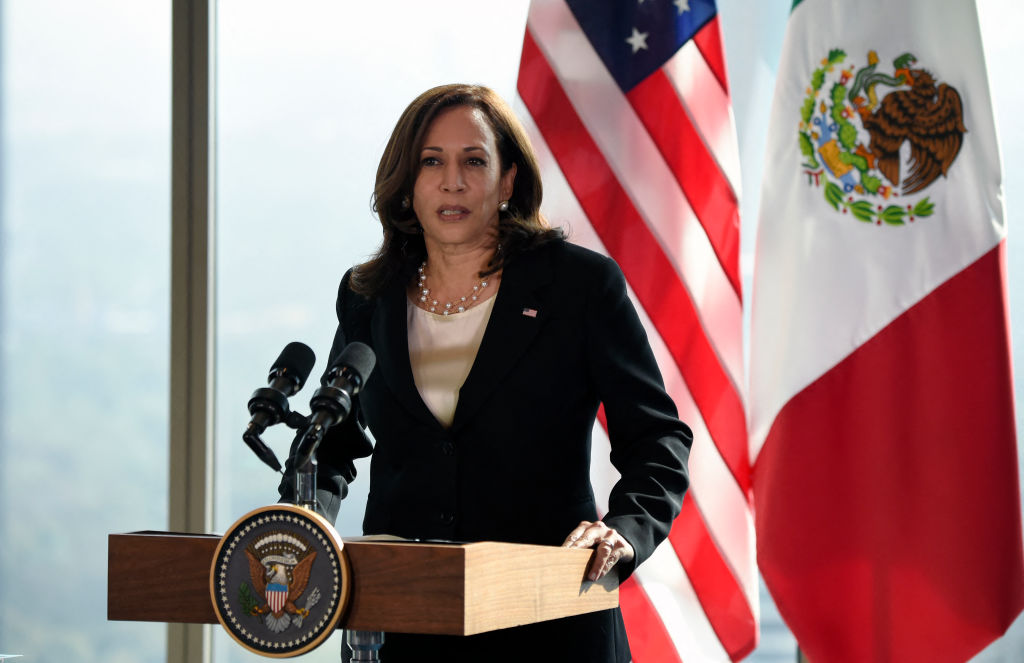Harris: U.S. and allies need to give migrants 'a sense of hope that help is on the way'


A free daily email with the biggest news stories of the day – and the best features from TheWeek.com
You are now subscribed
Your newsletter sign-up was successful
The U.S. will continue to "prioritize what's happening at the border and why people are going to the border," Vice President Kamala Harris said Tuesday evening during a press conference in Mexico City, adding that it is "short-sighted for any of us who are in the business of problem-solving to suggest we're only going to respond to the reaction as opposed to addressing the cause."
Harris is on her first foreign trip as vice president, and Mexico is her second stop, after Guatemala. "There's no question we are entering a new era around the globe, and this new era has made it quite clear that we are interconnected and interdependent, and what affects one country affects the globe," Harris said. "The president and I feel very strongly that what happens abroad matters to the people of the United States."
Migration is a "complicated issue, complex, and many factors are at play when we look at migration historically and currently," Harris said. While in Guatemala, Harris said the U.S. must address the root causes of migration from Guatemala, Honduras, and El Salvador, and she reiterated this during her Tuesday remarks.
The Week
Escape your echo chamber. Get the facts behind the news, plus analysis from multiple perspectives.

Sign up for The Week's Free Newsletters
From our morning news briefing to a weekly Good News Newsletter, get the best of The Week delivered directly to your inbox.
From our morning news briefing to a weekly Good News Newsletter, get the best of The Week delivered directly to your inbox.
"I want to be very clear that the problem at the border, in large part if not entirely, stems from the problems in these countries," she said. "I cannot say it enough — most people don't want to leave home, and when they do it is usually for one of two reasons: Either they are fleeing harm, or to stay home means they cannot satisfy the basic needs to sustain and take care of their families."
The U.S. and its allies know that if potential migrants have "a sense of hope that help is on the way," they "will follow their first preference, which is to stay at home," Harris said. That's where they want to be, she argued, "in the town, in the neighborhood, in the place where they grew up, where they speak the language, they know the culture, they go to that church every Sunday, the place where their grandmother lives."
A free daily email with the biggest news stories of the day – and the best features from TheWeek.com
Catherine Garcia has worked as a senior writer at The Week since 2014. Her writing and reporting have appeared in Entertainment Weekly, The New York Times, Wirecutter, NBC News and "The Book of Jezebel," among others. She's a graduate of the University of Redlands and the Columbia University Graduate School of Journalism.
-
 The ‘ravenous’ demand for Cornish minerals
The ‘ravenous’ demand for Cornish mineralsUnder the Radar Growing need for critical minerals to power tech has intensified ‘appetite’ for lithium, which could be a ‘huge boon’ for local economy
-
 Why are election experts taking Trump’s midterm threats seriously?
Why are election experts taking Trump’s midterm threats seriously?IN THE SPOTLIGHT As the president muses about polling place deployments and a centralized electoral system aimed at one-party control, lawmakers are taking this administration at its word
-
 ‘Restaurateurs have become millionaires’
‘Restaurateurs have become millionaires’Instant Opinion Opinion, comment and editorials of the day
-
 NIH director Bhattacharya tapped as acting CDC head
NIH director Bhattacharya tapped as acting CDC headSpeed Read Jay Bhattacharya, a critic of the CDC’s Covid-19 response, will now lead the Centers for Disease Control and Prevention
-
 Witkoff and Kushner tackle Ukraine, Iran in Geneva
Witkoff and Kushner tackle Ukraine, Iran in GenevaSpeed Read Steve Witkoff and Jared Kushner held negotiations aimed at securing a nuclear deal with Iran and an end to Russia’s war in Ukraine
-
 Pentagon spokesperson forced out as DHS’s resigns
Pentagon spokesperson forced out as DHS’s resignsSpeed Read Senior military adviser Col. David Butler was fired by Pete Hegseth and Homeland Security spokesperson Tricia McLaughlin is resigning
-
 Judge orders Washington slavery exhibit restored
Judge orders Washington slavery exhibit restoredSpeed Read The Trump administration took down displays about slavery at the President’s House Site in Philadelphia
-
 Hyatt chair joins growing list of Epstein files losers
Hyatt chair joins growing list of Epstein files losersSpeed Read Thomas Pritzker stepped down as executive chair of the Hyatt Hotels Corporation over his ties with Jeffrey Epstein and Ghislaine Maxwell
-
 Judge blocks Hegseth from punishing Kelly over video
Judge blocks Hegseth from punishing Kelly over videoSpeed Read Defense Secretary Pete Hegseth pushed for the senator to be demoted over a video in which he reminds military officials they should refuse illegal orders
-
 Trump’s EPA kills legal basis for federal climate policy
Trump’s EPA kills legal basis for federal climate policySpeed Read The government’s authority to regulate several planet-warming pollutants has been repealed
-
 House votes to end Trump’s Canada tariffs
House votes to end Trump’s Canada tariffsSpeed Read Six Republicans joined with Democrats to repeal the president’s tariffs
